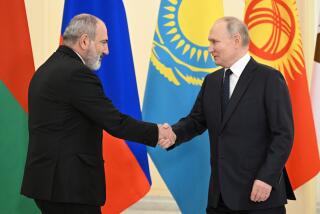Armenians Protest Over Enclave : Key Kremlin Meeting Due Today on Nagorno-Karabakh
- Share via
MOSCOW — More than 100,000 people staged a mass rally in the Armenian capital of Yerevan on Sunday as a high-level delegation left that city for Moscow to press Armenian demands to gain control of the disputed Nagorno-Karabakh region.
“Half the city must be there,” declared one resident of the capital contacted Sunday evening by telephone.
The delegation of 10 ranking members of the Armenian republic’s government, headed by the chairman of its Parliament, Grant M. Voskanyan, arrived here late Sunday to present Armenia’s case to what many see as a crucial meeting scheduled for today of the country’s highest body of state authority, the Presidium of the Supreme Soviet. The 39-member Presidium has the power to alter the boundaries of the country’s 15 republics.
Armenians have demanded the transfer to Armenia of the small, mountainous Nagorno-Karabakh region that is now an enclave of the neighboring Soviet republic of Azerbaijan. Most of the enclave’s residents are Armenian Christians, while most Azerbaijanis are Muslims.
Protest Campaign
To back their demands, which are strenuously resisted by Azerbaijan, Armenians have conducted a campaign of protests and strikes unprecedented in its intensity by recent Soviet standards. At least 36 people have been killed in the past five months in the disturbances.
Nagorno-Karabakh’s Armenian population has long wanted the transfer, but open protests have come only with the advent of Soviet leader Mikhail S. Gorbachev’s liberalization moves and a limited easing of restrictions on freedom of expression.
Armenian residents of Nagorno-Karabakh assert that they have been persecuted and that their culture has been oppressed by the Muslim Azerbaijani administration.
The authorities’ inability to end the Armenian disturbances is viewed as a potentially serious threat to Gorbachev’s broader program of reforms, and in recent days there have been growing signs the government may be preparing to meet further protests with force.
Gathering at Church Cemetery
Earlier Sunday in Moscow, more than 300 Armenians gathered at a church cemetery to hear a series of speakers attempt to dampen the highly charged atmosphere within their ethnic community. A strong police force stood nearby during the meeting.
“We will not have a demonstration,” declared a prominent Armenian artist, Karyun Nagapetyan, as police looked on. “I officially ask for calm.”
Both the mood at the gathering and the heavy show of uniformed strength surrounding it seemed to echo, albeit in microcosm, conditions 1,100 miles to the southwest in the Armenian capital, where troops patrolled the streets.
At a mass rally in Yerevan on Saturday, attended by an estimated 300,000 people, demonstrators agreed to end a two-week general strike there.
An official representative of the Armenian government in Moscow said Sunday that public transportation in Yerevan was returning to normal and that he expected factories to gradually start operating again from today.
Attempt to Reduce Tensions
The decision to end, or at least suspend, the strike is widely seen as an attempt to reduce tensions and possibly influence today’s Presidium meeting here.
But there are growing indications that the Kremlin leadership has already decided to toughen its stance against demonstrations.
Sunday’s meeting at the Armenian cemetery in Moscow was attended by roughly twice as many police as participants, and senior officers mixed with those attending the gathering, warning them not to go into the street, as they had on previous occasions.
“I must warn you now that any attempt to leave this cemetery and hold a demonstration in the street will be handled with full severity,” a senior police officer warned the gathering. “Anyone meeting in the street will be detained by my men.”
At the national level, an increasingly strident press campaign has denounced the protesters--and local functionaries who failed to keep public order--as cowards.
Enemies of Reform
The Communist Party newspaper Pravda continued this campaign Sunday by reprinting a particularly strong commentary from the regional Armenian Communist Party paper Kommunist, in which the Armenian strikers are cast as enemies of reform.
While the mood of Sunday’s cemetery meeting was restrained, participants said they feared that further protests would occur if the Presidium decided to leave the disputed region under the control of Azerbaijan.
Some supported a much-discussed compromise of administering the region directly from Moscow or placing it under the control of a third republic, rather than transferring it directly to Armenia.
“The main point is to take it away from Azerbaijan,” commented one participant at Sunday’s gathering. “Anything less than that and there can only be more problems.”
More to Read
Sign up for Essential California
The most important California stories and recommendations in your inbox every morning.
You may occasionally receive promotional content from the Los Angeles Times.













